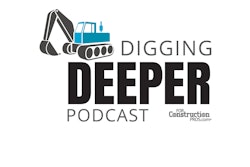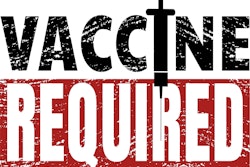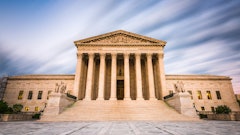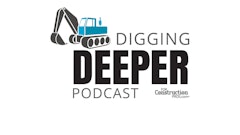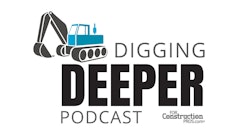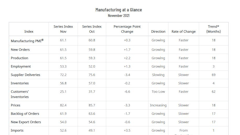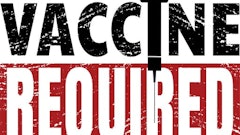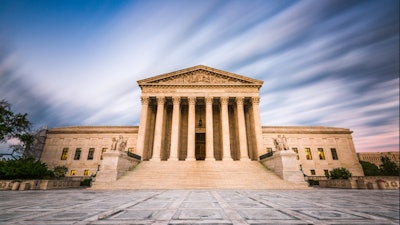
The U.S. Supreme Court split two COVID-19 protection-standard decisions today, confirming that the federal government does have the authority to require employers to be protected from infectious diseases, just not in blanket form regardless of their level of risk. The court issued a decision blocking enforcement of the Occupational Safety & Health Administration’s COVID-19 Emergency Temporary Standard (ETS) for employers of 100 or more pending that case’s litigation and lifting injunctions against the Medicare and Medicaid vaccine mandate for medical workers.
"Companies should expect to see more targeted rules coming from OSHA in the near future designed to fit through this opening provided by the Court,” said Aaron Goldstein, partner in international law firm Dorsey & Whitney’s Labor & Employment practice. He has been fielding questions today from employers about the mandate decisions. “Likely candidates for regulation include workplaces where social distancing is difficult, such as manufacturing lines, or where mask wearing is impossible, such as restaurants. In contrast, OSHA will be less likely to try to impose a vaccine mandate upon workplaces where employees are able to socially distance and wear PPE, or where work is done outdoors.
“The U.S. Supreme Court split its decisions today over federal vaccine mandates—blocking the OSHA vaccine mandate, while staying the injunctions against the Medicare and Medicaid vaccine mandate.
“In blocking the OSHA vaccine mandate while upholding Medicare and Medicaid vaccine mandate, the U.S. Supreme Court articulated a consistent philosophy. While a blanket Federal vaccine mandate is unconstitutional, vaccine mandates targeted at individuals and workplaces that are at particular risk from COVID-19 may be upheld.
“In upholding the Medicare and Medicaid vaccine mandate in a 5-4 ruling, the Court focused on the particular danger posed to those whom the Medicare and Medicaid systems serve, such as the elderly and those in poor health."
In summarizing the Court’s 6-3 majority opinion on blocking the OSHA mandate, the American Road and Transportation Builders Association points out that justices criticized the ETS as a “blunt instrument” which “draws no distinctions based on industry or risk of exposure to COVID-19,” while also noting it is “telling that OSHA, in its half century of existence, has never before adopted a broad public health regulation of this kind – addressing a threat that is untethered, in any causal sense, from the workplace.” The January 13 decision held that a stay of the rule was warranted because the parties challenging it were “likely to prevail” in their underlying litigation.
The Court, however, left the door open for more targeted regulations. They wrote:
“That is not to say OSHA lacks authority to regulate occupation-specific risks related to COVID–19. Where the virus poses a special danger because of the particular features of an employee’s job or workplace, targeted regulations are plainly permissible. We do not doubt, for example, that OSHA could regulate researchers who work with the COVID–19 virus. So too could OSHA regulate risks associated with working in particularly crowded or cramped environments.”
In court filings, ARTBA, the Associated Builders and Contractors and many other groups contend the ETS exceeds OSHA’s authority. Litigation will now continue in the 6th Circuit U.S. Court of Appeals, based in Cincinnati. While court proceedings move forward, employers will not have to comply with the ETS.
“ABC continues to support vaccinations and encourages members to use its COVID-19 vaccination toolkit to keep workers safe on construction jobsites,” said Ben Brubeck, ABC vice president of regulatory, labor and state affairs.
Those whose primary focus is the safety and productivity of American labor have a very different perspective on the court's call.
“I am disappointed in the court’s decision, which is a major setback to the health and safety of workers across the country," said U.S. Secretary of Labor Marty Walsh. "OSHA stands by the Vaccination and Testing Emergency Temporary Standard as the best way to protect the nation’s workforce from a deadly virus that is infecting more than 750,000 Americans each day and has taken the lives of nearly a million Americans.
“OSHA promulgated the ETS under clear authority established by Congress to protect workers facing grave danger in the workplace, and COVID is without doubt such a danger. The emergency temporary standard is based on science and data that show the effectiveness of vaccines against the spread of coronavirus and the grave danger faced by unvaccinated workers. The commonsense standards established in the ETS remain critical, especially during the current surge, where unvaccinated people are 15 to 20 times more likely to die from COVID-19 than vaccinated people. OSHA will be evaluating all options to ensure workers are protected from this deadly virus.
“We urge all employers to require workers to get vaccinated or tested weekly to most effectively fight this deadly virus in the workplace. Employers are responsible for the safety of their workers on the job, and OSHA has comprehensive COVID-19 guidance to help them uphold their obligation.
“Regardless of the ultimate outcome of these proceedings, OSHA will do everything in its existing authority to hold businesses accountable for protecting workers, including under the Covid-19 National Emphasis Program and General Duty Clause.”
Jessica E. Martinez, MPH, co-executive director of the National Council for Occupational Safety and Health issued this statement:
“At a time when the COVID-19 virus is spreading faster than ever, workers will pay the price – with their very lives – for this wrong-headed decision by the Supreme Court. A deeply flawed opinion ignores law and precedent that clearly states OSHA’s authority to protect workers from dangerous conditions.
“OSHA can and should still require employers to meet their legal and moral obligation to provide a workplace safe from known hazards, which certainly includes infectious diseases like COVID-19.
“National COSH and our partners and allies will continue to support workers as they fight for and win crucial safety protections. These may include paid time off for illness, vaccination and recovery; employer-paid personal protective equipment; improved ventilation; social distancing and other measures that make sense in specific workplaces.”






